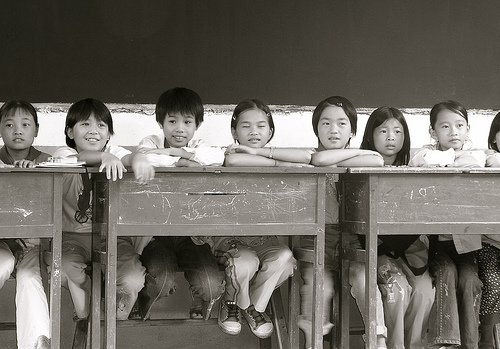
Photo taken by Chris Suderman
In his book Through the children’s gate, Adam Gopnik said this about children:
Children reconnect us to romance. For children, … every day is the first day of love: The passions that for us grown-ups rise and fall only in exceptional circumstances, unexpected storms on the dull normal beach where the tide breaks unchangingly, rise every day for them. Shock, hatred, infatuation: “I hate you,” they cry, slamming the door, and they mean it; and then the door opens fifteen minutes later for dessert. They compel us to see the world as an unusual place again. Sharing a life with them is like sharing a life with lovers, explorers, scientists, pirates, poets. It makes for interesting mornings.
I like this quotation for a few reasons. Firstly, to remind me of the passionate and immediate nature of young people. If at school they seem indifferent, apathetic, unengaged, then we need to ask ourselves why. We look to ourselves and what we are doing as teachers to make them behave in a way which is actually contrary to their nature.
Secondly, this passage tells me what we can gain from being with young people, what we can learn from them. Our role as teachers is not to ‘teach’ them in the sense of pouring into them what we know better, it is to listen, to bring out, to – with time, the time it takes to know a person – understand where their interests lie, what their passions are, how we can harness their dreams to educational opportunities. We provide the environment, teach skills, encourage and guide, but we work with the unknown – the unknown possibilities of what each young person is yet to create, to achieve.
As I think about returning to school soon, starting along that well worn cyclical path again, I’m gathering together the technology tools that I look forward to using with students, but I’m not thinking about the technology – I’m thinking about the process, the learning and teaching process that will take place. This year I’d like to focus on providing learning experiences which are from people, from communities, learning not from static texts but from living, thinking people – some from other hemispheres – from conversations, comparisons, real discoveries. I’m hoping that this year’s learning will not come solely from one teacher. The net will be cast wide. What treasures will be collected in the net?

Tania,
Thanks for sharing both this quote and your reflection. It makes me think of something wise that TH White wrote in _The Once and Future King_ — about how people develop a sixth sense: the wisdom of the world. Young people don’t have that yet and don’t know it, so their view of the world is new and changing and always powerful for them. As people who have that sixth sense, we can sometimes downplay the true power of those emotions that younger people have. We have perspective that they do not, but that is not always good. Your thoughts made me think of that — how sometimes to revel in the moment and let it be powerful for what it is is what matters most.
Susanne, ‘new and changing and always powerful’ is what I’m hoping to harness into creativity at school this year. If we’re prescriptive and definitive about their tasks, then we might get from them their version of what we want. Through choice and an opportunity to play, I’m hoping to discover the best and most creative in students. As you say, we can sometimes downplay the power of young people’s emotions instead of allowing these emotions to become the driving force of more engaging projects.
I liked this post and your viewpoint that our role as teachers is not to transfer knowledge to children, but to discover the interests and guide them on the path to following them. I recently posted a blog article on the topic of Inquiry-based Learning and structuring our classrooms to encourage students to follow their own passions. This will help to make learning real to them, and so much more valuable.
Thanks for your link to your post, TeacherJay. You make a good point about inquiry-based learning allowing students to follow their passions. Learning becomes real because it comes through a process where the student is the driver.
Hi Tania,
I tagged you for a meme at my site about a learning goal for 2009. Hope you can take part.
OK, I’ll have a look.